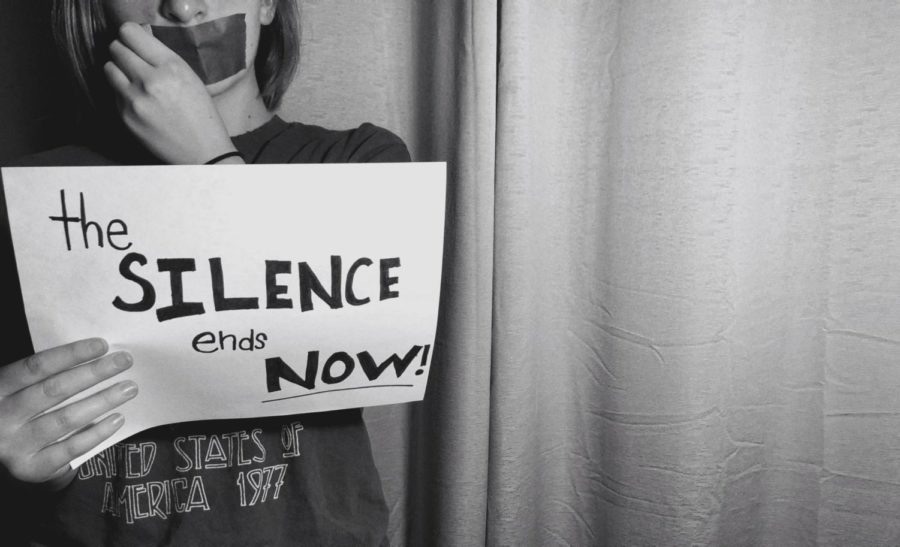Ninety-seven percent of sexual offenders walk free.
Only 15 to 35 percent of sexual assaults are reported.
Sexual assault can happen to men, women, or children.
According to RAINN, an anti-sexual violence organization, 82 percent of juvenile victims are female.
“The first time it happened I was 4,” said sexual assault victim Callie Myers*. “The next time, I was 6.”
According to NSVRC, one in five women and one in 71 men will experience sexual assault in their lives.
“Being stuck in a situation like that and not removing yourself when there were multiple possibilities, you feel stuck,” said Catherine Lundien, the Students Offer Support (SOS) core sexual assault leader.
Minors, such as the students in SOS, are often the most vulnerable members of society. Females ages 16 to 19 are four times more likely to get sexually assaulted than the general population.
Perpetrators often choose to take advantage of the vulnerability of minors and victimize them.
“A range of things could be reasons why young girls are more targeted than young boys: personal fetishes, pedophilic thoughts, etc.. But nothing is an excuse or justified, sexual assault is sexual assault,” Jay Valentin said.
Given the young age of many victims, they are often unaware of the inappropriate behavior of their perpetrators. Many do not even realize it is wrong. Ninety-eight percent of child sexual abuse cases reported were found to be true, however, one in three adults would not believe a child if they claimed they were sexually assaulted.
Myers said, “I didn’t realize it was wrong until I was 13. I grew up with it happening, so it seemed normal, and I was too young to know otherwise.”
Many victims do not report their assaults until it is too late, or they abstain from confessing due to fear.
“I was scared that I would get into trouble with my mom and others because I believed that it was my fault at the time,” said Lundien.
Others think that if they don’t say anything, the problem will just go away.
“I think a part of me didn’t want to deal with it,” Myers said.
People tend to either blame victims or ignore them. Myers and Lundien want people to know that it’s never the victim’s fault, no matter the situation.
Lundien said, “Sometimes you just feel helpless, and you think to yourself: ‘how it could be my fault?’”
Victims are also scared to speak up about their experiences because they fear that people will not believe them.
“It’s been drilled into my head that boys will be boys, and girls just have to deal with it,” Myers said. “My parents believed me, but my aunt told me I was lying when I finally got the courage to speak out. It used to hurt a lot, I thought family was supposed to always be there for you.”
Though 50 percent of assaulters blame the victim for what happened, Myers stresses that the attacker should be held accountable.
“If you were wearing something tight, short, or low-cut it’s not your fault. Your body isn’t the problem, you’re not even the problem, even if you changed your mind halfway through,” Myers said.
Even so, victims often blame themselves.
“Victims sometimes blame themselves because they might have been initially attracted to the person,” said Carlmont’s Crisis Counselor and SOS Adviser Shelly Bustamante. “They enjoyed the preliminary affection, flirting, and then it went too far. Some victims think they should have been more forceful when they said ‘No.’”
Many believe that Carlmont is lucky to have programs like SOS, which spread awareness and education about sexual violence.
“I think SOS and Healthy Connections do a good job of getting the word out,” Bustamante said.
According to RAINN, sexual assault and rape rates have dropped from 4.3 assaults per 1,000 people to 1.6 per 1,000 people, from 1993 to 2015.
While this is a positive trend, measures can still be taken to spread awareness. Not all schools and communities have resources to educate people.
“I definitely think we need more education on the matter so that, maybe, kids in the future can be spared from the pain and trauma. We need a safer place for victims, and that starts with us trying to get society to be more accepting,” Myers said.
It is important for survivors to understand that they are not alone.
“I can let survivors know that anything that happened is not their fault. I can remind them they are strong, and this doesn’t define who they are,” said Lundien. “A person going through that situation should know that they aren’t the only person who this has happened to.”
According to Valentin, victims shouldn’t be afraid to speak up about what happened. Instead, they should be role models to those who are too afraid to speak.
“Tell someone. Go to therapy. Don’t be afraid to get help and tell your story. It’s not your fault no matter if it happened when you were little or if it happened a week ago. Male, female, transgender, or non-binary, you did nothing wrong,” Myers said.
National Sexual Assault Hotline: 1-800-656-4673
*Some names were changed to protect the confidentiality of sources.











